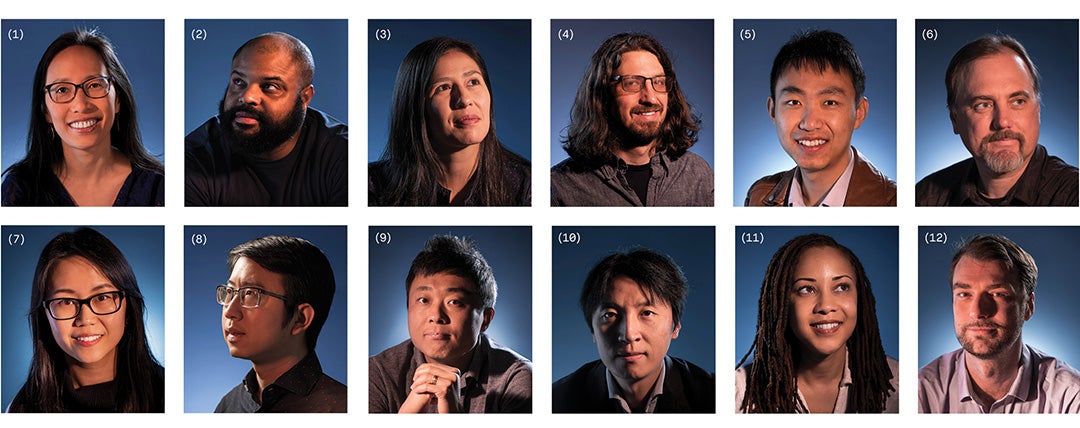A Head Start
Junior Rice faculty are earning attention — and funding — from the National Science Foundation.

Spring 2024
By Rachel Fairbank
2023 NSF Career Award Recipients Pictured Above
Evelyn Tang, Physics and Astronomy (1)
Kory Evans, Biosciences (2)
Lauren Stadler, Civil and Environmental Engineering (3)
Brandon Levin, Mathematics (4)
Hanyu Zhu, Materials Science and Nanoengineering (5)
Todd Treangen, Computer Science (6)
Yimo Han, Materials Science and Nanoengineering (7)
Songtao Chen, Electrical and Computer Engineering (8)
Kaiyu Hang, Computer Science (9)
Taiyun Chi, Electrical and Computer Engineering (10)
Danielle King, Psychological Sciences (11)
James Chappell, Biosciences (12)
Every year since 1995, the National Science Foundation’s Faculty Early Career Development Program has awarded five-year grants to junior faculty members who serve as academic role models in research and education. These grants, which are known as CAREER awards, are some of the most prestigious available to early-career researchers and often serve as a foundation for an illustrious career in research.
For 28 years in a row, junior faculty at Rice have been recognized with these honors. In 2022, Rice set a record with 12 CAREER award recipients, and in 2023, it repeated the record, receiving another 12 CAREER grants in natural sciences, engineering and social sciences. It’s a trend that signals Rice’s increasing prominence as a research institution and the caliber of its professors at all career stages.
Read on for three examples from the most recent cohort of CAREER award recipients along with a list of the 2023 honorees.
Creating tools to map the brain
In order to better understand the brain’s mysteries, electrical and computer scientist Taiyun Chi was awarded a $500,000 CAREER award for research that will focus on developing an implanted neural interface — a tool for deciphering the brain’s activities. The work has implications as a potential clinical treatment, which could include restoring lost sensory or motor function to paralyzed patients or treating disorders via deep brain stimulation.
“To fully unlock the potential of neural interfaces for future widespread and standard-of-care human clinical use, new device capabilities need to be developed with significantly improved hardware performance,” Chi says.
Engineering more robust microbial communities
Communities of microorganisms exist all around us and play a number of important roles, from supporting digestion in the gut to breaking down organic matter in soil. As part of a $650,000 CAREER award, synthetic biologist James Chappell will examine ways of applying genetic engineering to microbial communities with a goal of understanding how they can be programmed to address global sustainability challenges.
“Having the ability to genetically manipulate such communities will allow us to study and better understand them,” Chappell says. “We could also program them with new or improved functions that improve human health, crop yields and global sustainability.
Supporting employees facing race-based attacks
Race-based threats can happen anywhere, including at work, and they can have significant social, emotional and physical consequences. Psychologist Danielle King will use her $530,000 CAREER award to examine how organizations can support employees who are facing such threats — and what strategies employers could use to prevent them from happening altogether. She’ll also study what impact these threats have on employees and which organizational resources could help.
“This project seeks to help us uncover organizational means to address identity-related stressors and support employee health and thriving,” King says.
View all CAREER winners at provost.rice.edu/nsf.
